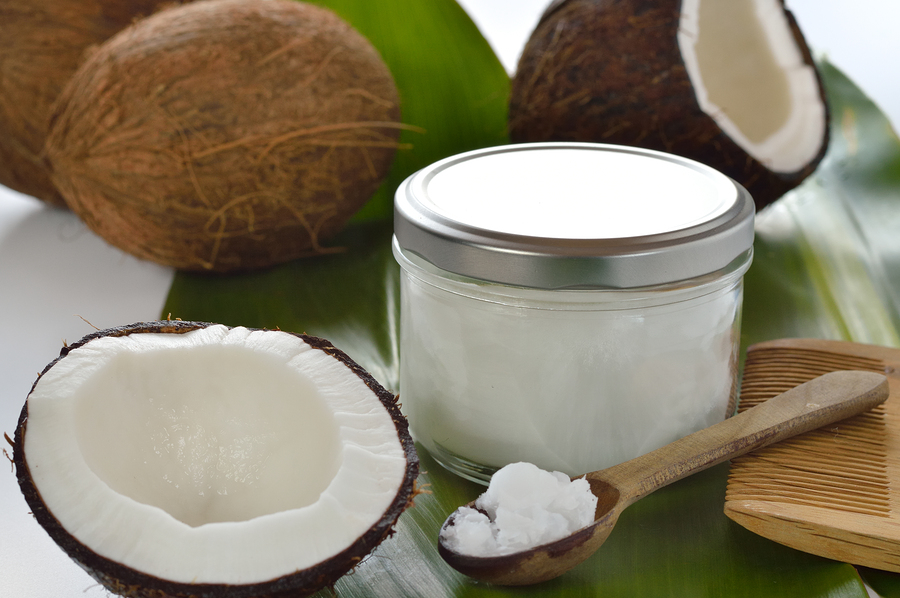Oil. There’s a word laced with controversy if ever there was one.
When we hear the word oil in connection with food and nutrition, we’ve been conditioned to react negatively. Oil isn’t good for us, right?
Well, like most things in life, the distinction of whether oil is healthy for us is not black and white.
I’m sure you’ve used other oils when cooking, vegetable and olive being some of the most common.
Olive oil has many actual health benefits, which we won’t go into here since today we’re discussing another type of oil. One you may or may not have had much exposure to as yet.
That oil is coconut oil.
Not Just For The Beach
We’ve all detected the pleasing fragrance of coconut oil and butter pool- or beachside, as many of our favorite sunblocks contain coconut oil or butter.
But what about cooking with and eating coconut oil? If you haven’t done so yet, it’s time to learn why you should.
It may surprise you to find that coconut oil has many surprising and enormously significant health benefits.
Almost A Miracle Oil
Calling anything a miracle, much less oil, may seem a bit overblown.
But considering that populations that eat generous amounts of coconut oil are some of the healthiest on the planet, it’s worth taking a closer look.
When I started researching the benefits of coconut oil, I found myself thinking it might be easier to list the drawbacks. There certainly seem to be fewer of them.
In a nutshell, no pun intended, coconut oil is good for nearly every aspect of your health and well-being.
It provides sun protection for hair and skin, improves digestion, relieves stress, boosts your immune system and promotes cardiac and kidney health.
Coconut oil provides protection from heart disease, high blood pressure, HIV, diabetes, even cancer. It’s also great for promoting strong teeth and bones.
You see what I mean? What doesn’t coconut oil do?
But what about the fact that coconut oil is significantly higher in saturated fat than other types of oil? Isn’t that a problem?
Saturated Fat’s Bad Rap
New studies are indicating that the whole saturated-fats-are-bad-for-you argument is a myth.
Also, the fatty acids in coconut oil are not the run-of-the-mill composition of other saturated fats.
Rather, the fatty acids in coconut oil are Medium-Chain Triglycerides (MCTs). MCTs are metabolized by the body much differently than long-chain triglycerides, which are the ones found in most of our dietary fats.
MCTs head straight to the liver from the digestive tract. There they’re turned into energy for our bodies or converted into ketone bodies, known to provide therapeutic effects for certain brain disorders, such as epilepsy or Alzheimer’s.
Let Me Count The Ways Benefits
The benefits of coconut oil are much easier to see if we break things down a bit. So let’s do that.
Fights obesity
The medium-chain triglycerides in coconut oil allow our bodies to use energy more efficiently than long-chain triglycerides found in other fatty acids. Greater energy expenditure translates into a higher fat burn.
And we all know that the more efficiently our bodies burn fat, the better our odds of losing weight.
So while a fatty acid, or oil, may seem at first glance to cause weight gain, with coconut oil, the opposite is true.
(Note: This does not mean you can eat tons of coconut oil. Like any food, consuming too many calories can still lead to weight gain.)
But if you’re going to use oil to saute that fillet of sole for dinner, reach for coconut oil instead. Your fish will taste great, and you’ll reap the benefits of extra energy and fat burn.
Fights infection
About 50% of the fatty acids in coconut oil is made up of a material called Lauric Acid. Lauric acid has properties that fight bacteria.
The breakdown substances that result as your body metabolizes coconut oil, along with lauric acid, kill Staphylococcus Aureus, one of the most dangerous pathogens, as well as Candida Albicans, known to cause yeast infections.
Who knew an oil could have infection-fighting properties?
Decreases hunger
An interesting find among people who eat coconut oil is that they seem not to get hungry as quickly. Something about the metabolization of the fatty acids in coconut oil has been shown to have appetite suppressing qualities.
And the benefit of reduced appetite is obvious, right? But just in case it’s not, the less you eat, the easier it is to lose weight or maintain a healthy weight.
Reduces epileptic seizures
The ketone bodies produced by the metabolization of coconut oil’s fatty acids has been shown to have a therapeutic effect upon drug-resistance epileptic seizures in children.
Reduces risk of heart disease
Yes, coconut oil has a high saturated fat level. But as I mentioned before, that is beginning to be discounted as a significant health risk.
In one study, coconut oil was found to increase the levels of HDL cholesterol (the good kind), while decreasing the Total and LDL cholesterol levels (not so good kind), over soybean oil.
Coconut oil has also been found to improve blood coagulation factors and antioxidant status, in addition to raising HDL levels and decreasing Total and LDL levels, in rats.
All of these benefits of coconut oil add up to a reduction in the development of heart-related diseases.
Improves quality of skin and hair
While there are obviously numerous health benefits to eating coconut oil, there are also some fantastic cosmetic benefits. When applied to the skin, the lipid and moisture content of the skin is greatly improved.
Coconut oil also protects against hair damage and appears to have a limited amount of sun protection, by blocking about 20% of the sun’s ultraviolet rays.
But don’t ditch your sunblocks just yet. You still need greater than 20% sun protection when spending significant periods of time in the sun. But this extra protection is a boon when going about our daily activities.
Reduces Alzheimer’s Symptoms
In Alzheimer’s patients, once again, it’s the ketone bodies that provide the benefit here.
The brains of Alzheimer’s patients appear to have a reduced ability to use glucose for energy. The ketone bodies can serve as an energy source for the brain. In fact, it’s thought that ketones can provide an alternative energy source for malfunctioning cells, reducing symptoms of Alzheimer’s.
This indication of increased brain function is leading to more intensive research now being done on the use of medium-chain triglycerides as a therapeutic agent in Alzheimer’s disease.
Where You Can Get Your Coconut Oil
There are many benefits of coconut oil, as you can see, and I haven’t even covered every single one in this article. It would make it way too long!
Little did I know when I sat down to write about coconut oil, that it could quickly turn into a lengthy dissertation!
Do some Google searches to find tons of information on coconut oil. Explore to your heart’s content.
As for what kind of coconut oil to buy, to reap the benefits of coconut oil, you must get organic, virgin coconut oil. Read the labels when you shop to choose the highest quality brands.
You can find coconut oil at your grocery stores, usually in the healthy food section.
And don’t forget about Amazon. It’s a great place to explore all the different brands, as well as read posted reviews, to narrow down your search.
Add coconut oil to your daily cooking and eating routines and just watch how your health begins to improve.
It may just turn out to be your best and most potent superfood.
All from a little jar of oil. Who knew?
If you enjoyed this post, please pass it along to anyone you think would benefit from reading it. And if you’d like information on how to get help learning about other superfoods and improving your health, just click here. We have a program just for you. Slim, Sexy & Smart.
Teri
Latest posts by Teri (see all)
- Sleep Is a Necessary Part of Wellness - February 1, 2018
- Nutrition on the go - January 25, 2018
- Home Workouts: Lower Body - January 18, 2018


